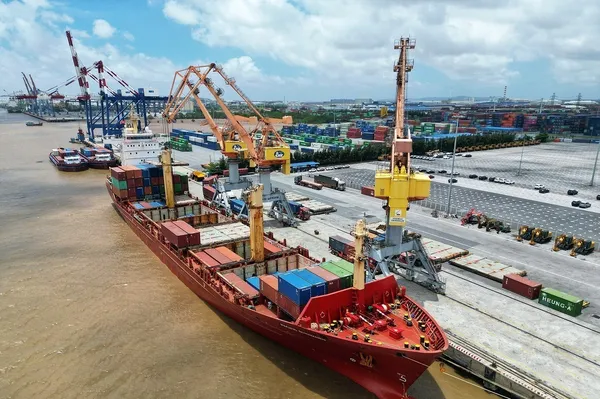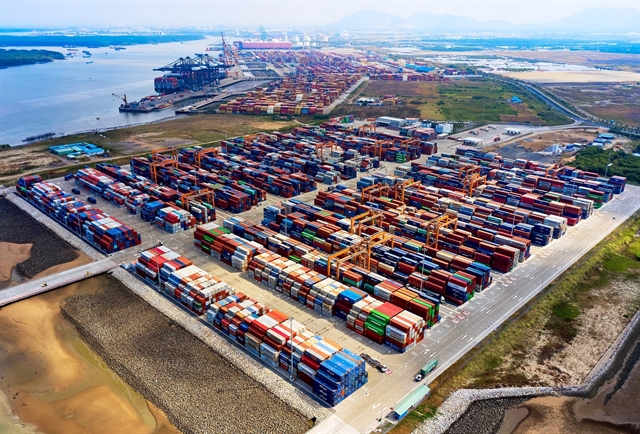
 |
| Fish sauce production at a plant of Masan in Phú Quốc islands, Kiên Giang Province. Việt Nam needs to develop policies to unleash resources and promote the position and role of large corporations for socio-economic recovery and development. — VNA/VNS Photo Lê Huy Hải |
HÀ NỘI — Việt Nam needs to promote the development of national corporations as an important force to drive economic growth, experts have said.
Developing enterprises, including large corporations, have been considered an important solution to improve production capacity and build an independent and autonomous economy. It’s time to further promote their role in this period when the Vietnamese economy needs added impulse to recover from the COVID-19 pandemic and global economic slowdown, according to the Ministry of Planning and Investment.
The ministry said that Việt Nam has orientations to develop national enterprises and large-scale enterprises to play leading roles in key industries and fields and be capable of performing strategic tasks leading the industrialisation and modernisation process.
These policies demonstrate the message of the Party and the Government that Việt Nam will develop a business community with unique identities and brands to build an independent and self-reliant economy, Minister of Planning and Investment Nguyễn Chí Dũng said.
International experience from countries which achieved success in industrialisation have shown that large corporations and national corporations played an important role in the early stages of economic reform.
They would help create an ecosystem to lead the development of small and medium sized enterprises and enable participation in the domestic and international value chains.
According to Trần Toàn Thắng from the ministry’s Development Strategy Institute, the 500 largest private enterprises in Việt Nam have an average workforce 160 times higher and total assets 376 times higher than the rest of the private sector.
Despite accounting for a modest 0.075 per cent of the total number of private enterprises across the country, the top 500 have been creating jobs for 12 per cent of the labour force, have 28 per cent of the total assets, 18 per cent of revenue and contributed 18.4 per cent of the State budget from the private sector.
Compared to foreign direct investment (FDI) and State-owned enterprises (SOEs), the top 500 have greater impact, he said.
He cited statistics that every 1 per cent increase in investment capital of the top 500 raises investment by the domestic private SMEs by 0.45 per cent in the first year and 0.26 per cent in the following years.
This means that the investment of large corporations promotes the investment of smaller enterprises as their suppliers or satellite enterprises.
What policies?
Emphasising that every economic sector is equal in a transparent and competitive environment, Thắng said each will need separate policies to promote their development.
Việt Nam has policies for cooperatives as well as micro, small and medium sized enterprises, he said, adding that specific mechanisms should also be raised for large corporations.
The power of large corporations contributed significantly to the development of major economies such as the Republic of Korea, Japan and China, he said.
Without strong Government support through different measures and policies, it would be difficult to have globally famous private brands with capitalisation of hundreds of billions of dollars like Samsung, Huyndai, LG, Daewoo, Toyota, Hitachi, Mitsubishi, Honda, Huawai, Alibaba and Tencent, for example, Thắng said.
“Việt Nam needs to have big names on par with the leading businesses in the region and the world. Large corporations will create a spillover effect on productivity and play a role as a leading force in the market.”
“It is not only the national pride, but large enterprises can shape business models and growth as well as playing a decisive role in strategic issues such as technological innovation and participation in global value chains,” he said.
Nguyễn Quốc Việt, deputy director of the Việt Nam Institute for Economic and Policy Research, said a majority of large enterprises in Việt Nam operate in the real estate sector. Policies should be raised to encourage them to invest in high technologies to build the core strength.
According to Dũng, it’s the right time to unleash resources and promote the position and role of large corporations for socio-economic recovery and development.
The ministry is proposing to the Prime Minister a study on building mechanisms and policies for the formation and development of national enterprises to promote their pioneering role in emerging industries with competitive advantage, moving toward an independent and self-reliant economy.
The project will select industries with competitive advantages, allowing Việt Nam a shortcut toward becoming an industrialised country, such as offshore wind, ammonia, green hydrogen, steel production, electric vehicles, telecommunications, electronics, semiconductors and infrastructure, Dũng said.
The ministry planned to propose a number of specific mechanisms and policies to maximise the resources and promote investments in innovations such as fintech, cyber security, AI robotics, telecommunications, and research and development towards sustainability. In addition, the policies would focus on encouraging renovations in governance such as ESG practices.
However, developing appropriate policies to promote the development of large corporations to drive SMEs in the right direction is a problem which could not be easily solved in the short term, but requires strong determination and firm action, Dũng said. — VNS






















